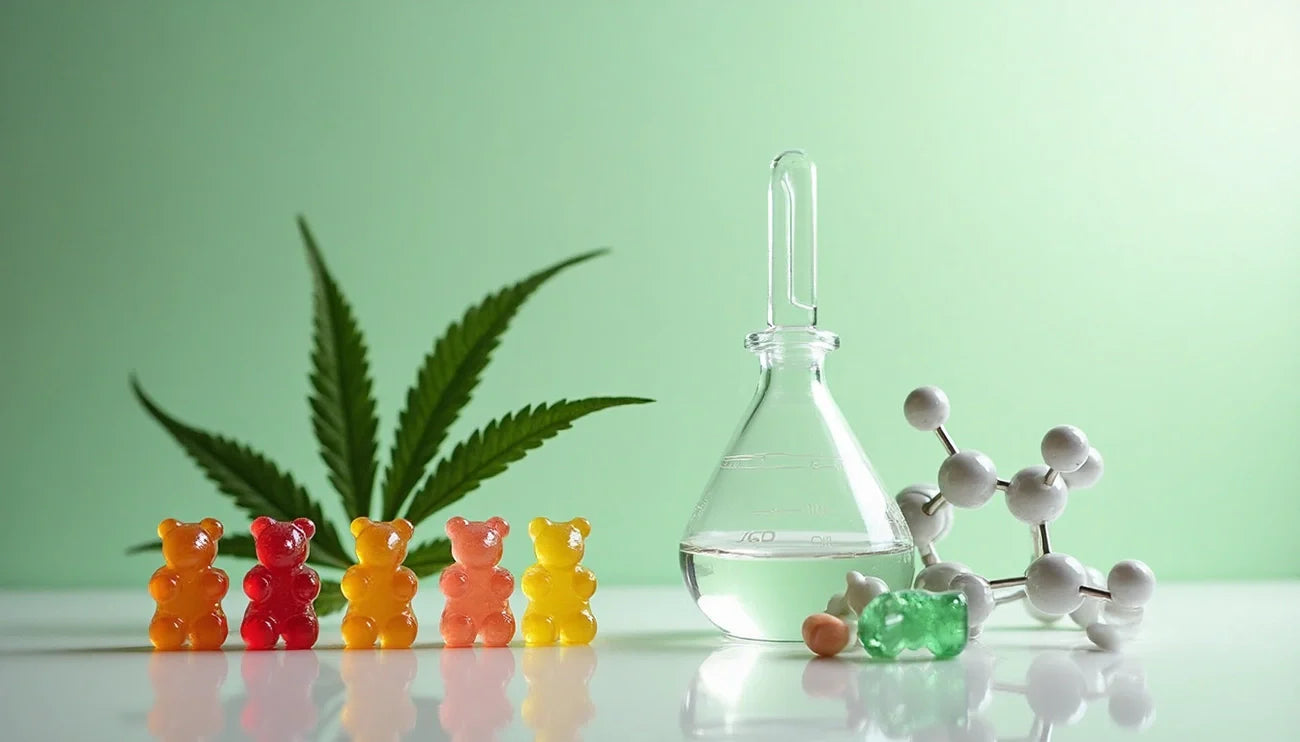
Is CBD addictive? This question pops up often as people think about trying CBD gummies or other cannabidiol products. CBD makes up about 40% of cannabis plant extracts. It stands as the most abundant cannabis compound, yet people still misunderstand its effects.
The World Health Organization states clearly that cannabidiol shows "no effects indicative of any abuse or dependence potential" in humans. Marijuana raises heart rate and creates euphoric feelings. CBD works differently - it doesn't change heart rate or affect how your brain works. A 2017 study in the Journal of Drug and Alcohol Dependence backs this up. The research shows CBD's dependence risk matches that of a sugar pill.
This piece breaks down what science really tells us about CBD's addiction potential. You'll see how CBD is different from THC and learn essential facts before trying CBD gummies. Let's cut through the myths and get to the facts about these products that keep growing in popularity.
Common Myths About CBD and Addiction
CBD products have gained massive popularity, but many myths about their effects and risks continue to spread. Let's get into some common myths about CBD and addiction that will help you make better choices.
Myth 1: CBD causes a high like marijuana
People often think CBD creates the same euphoric feelings as marijuana. This belief is completely wrong. CBD won't get you high because it's non-psychoactive. THC (tetrahydrocannabinol) makes you feel intoxicated from marijuana, not CBD. Your brain's receptors barely respond to CBD. You might feel more relaxed with CBD, but you won't feel intoxicated. The World Health Organization backs this up - pure CBD shows no signs that people could abuse it.
Myth 2: All cannabis products are addictive
This oversimplified view misses the vital differences between cannabis compounds. THC content determines how addictive cannabis products can be, not CBD. Scientists publishing in the Journal of Drug and Alcohol Dependence discovered CBD is no more habit-forming than a sugar pill. Hemp-derived CBD products must contain less than 0.3% THC by law. That's nowhere near enough THC to create addictive effects. The difference matters because THC's properties are what make marijuana addictive.
Myth 3: You can't build a habit with CBD
CBD might have low addiction risk, but this myth goes too far the other way. Your body can build tolerance to CBD if you use it regularly. You might need larger doses to feel the same effects. It also puts you at risk if you have struggled with substance abuse, especially when mixed with other substances. Building tolerance doesn't mean you're addicted, and people who stop taking CBD don't experience the withdrawal symptoms that come with real physical dependence.
Myth 4: CBD gummies are always safe and regulated
Problems are systemic in CBD quality control, making this belief dangerous. Research shows 69% of CBD products had wrong labels. Some "pure CBD" products contained illegal THC levels or harmful contaminants. The FDA barely regulates most CBD products, so labels can be misleading. Your CBD gummies might contain pesticides, heavy metals, or harmful bacteria. Stay safe by choosing products with certificates of analysis from independent labs that verify what's inside.
What Science Says About CBD and Dependence
The sort of thing I love about scientific research is how it explains CBD's interaction with our bodies, especially when you have questions about its dependence potential. Let's learn about what studies tell us about this increasingly popular compound.
CBD vs THC: Key differences in how they affect the brain
CBD and THC have similar molecular structures (21 carbon atoms, 30 hydrogen atoms, and 2 oxygen atoms), but they affect the brain in very different ways. Their subtle atomic arrangement creates distinct effects:
CBD doesn't strongly bind to cannabinoid receptors and affects them indirectly. Then it produces no intoxicating effects. THC binds directly to CB1 receptors and creates the characteristic "high".
THC gets more and thus encourages more dopamine release (the "feel good" hormone). CBD works through multiple pathways that include serotonin receptors and TRPV1 channels. This basic difference explains why THC can be habit-forming while CBD typically isn't.
Is cannabidiol addictive according to research?
Scientists strongly agree that CBD lacks addiction potential. The World Health Organization makes it clear: "In humans, CBD exhibits no effects indicative of any abuse or dependence potential".
A detailed clinical study of polydrug users showed CBD had no abuse potential or physical dependence. Later research with 30 healthy volunteers proved that stopping CBD use suddenly didn't cause withdrawal symptoms.
Research in neuropsychopharmacology shows "acute CBD alone is unlikely to significantly impair daily functioning", which supports its non-addictive nature.
Understanding psychological vs physical dependence
Physical dependence happens when your body adapts and needs a substance to work normally, which leads to withdrawal symptoms when stopped. Psychological dependence focuses on emotional and mental reliance.
Research shows CBD doesn't create physical dependence. CBD doesn't affect brain reward centers like other substances, so it doesn't cause withdrawal symptoms when you stop using it.
CBD shows promise in treating substance use disorders because it might reduce drug cravings and withdrawal symptoms. Clinical trials have shown good results for CBD in treating nicotine, cannabis, and opioid dependence.
Research suggests CBD might help fight addiction by adjusting brain reward circuits and reducing drug-seeking behaviors. This makes it a potential ally rather than a threat in addiction treatment.
CBD Gummies: Are They a Special Case?
CBD gummies have gained massive popularity among cannabidiol users. These chewy treats offer a different experience compared to other CBD forms. The ingredients in these gummies can help you better understand any concerns about potential addiction.
What's inside a CBD gummy?
The main ingredients in CBD gummies combine cannabidiol from hemp plants with components that create texture, sweetness, and flavor. The chewy texture comes from either pectin (plant-based) or gelatin (animal-derived). You'll find sweeteners like organic tapioca syrup and cane sugar, along with natural fruit flavors in most products.
CBD, the star ingredient, comes in three main forms. Full-spectrum contains all cannabinoids including up to 0.3% THC. Broad-spectrum has multiple cannabinoids but no THC. CBD isolate gives you pure CBD only. Quality gummies often include carrier oils like MCT oil that help your body absorb CBD better.
When gummies might contain more than just CBD
CBD gummies pack more than their basic ingredients. Many products add extras like melatonin to help you sleep, vitamin C to boost immunity, or turmeric to fight inflammation. Some manufacturers also use artificial colors, high-fructose corn syrup, or chemical preservatives.
Label reading matters now more than ever. A 2019 study showed all but one of these Americans read food product labels at the time. This trend shows people care more about what goes into their bodies. Anyone worried about dependence should know exactly what their gummies contain beyond CBD.
How to read labels and choose reputable products
Quality CBD gummies start with proper labeling. Look for cannabidiol or hemp extract on the label - not just hemp seed oil, which lacks CBD. The milligrams per serving matter more than the total package amount.
A Certificate of Analysis (COA) from a third-party lab proves product quality. This document shows CBD content and confirms the product has no contaminants like pesticides, heavy metals, or excess THC. You can find the COA by scanning the product's QR code or visiting the company's website.
The quality of CBD products affects their addiction potential. Products with poor regulation and unexpected ingredients might lead to problematic use. To name just one example, see zebra CBD for products that value transparency and third-party testing.
Tolerance, Withdrawal, and Long-Term Use
Learning about CBD's long-term effects helps us understand if people might become dependent on it. CBD users often ask about building up tolerance and what to expect when they stop using it. These questions usually come up because people mix up CBD with THC.
Can you build a tolerance to CBD?
Your body might adjust to regular CBD use over time, just like it does with many other substances. Research shows some users notice weaker effects as they continue using CBD. They might need higher doses to get the same results. Each person's experience is different based on their metabolism, how often they use it, and how they take it.
Scientists have discovered something quite remarkable called "reverse tolerance" with CBD. Some users need less CBD as time goes by, not more. This happens because CBD might help the body's endocannabinoid system work better on its own, so it needs fewer external cannabinoids.
A short break can help if you notice tolerance building up. Your body resets itself, and lower doses start working again when you resume. One study that looked at epilepsy patients found about 32.6% developed tolerance after roughly 7.3 months.
What happens if you stop using CBD?
CBD works differently from substances that cause physical dependence. People who stop taking it rarely experience withdrawal symptoms. A clinical study watched 30 people who took 750mg of CBD twice daily for four weeks. The results showed "no evidence of a physical withdrawal syndrome after abrupt cessation of CBD".
The World Health Organization backs this up. They emphasize CBD's good safety profile and how well people tolerate it. Any changes you might notice after stopping CBD likely mean your original symptoms are coming back, rather than withdrawal effects.
Why some people feel dependent on CBD
CBD doesn't create physical addiction, but you might develop a psychological attachment to it. This usually happens when people rely on CBD to handle stress, anxiety, or other emotional issues and feel they can't cope without it.
This psychological attachment works nothing like physical addiction. A study in the Journal of Drug and Alcohol Dependence found CBD has the same dependence potential as a sugar pill.
The feeling of "dependence" usually means you're worried about losing CBD's benefits rather than actual addiction. It makes sense - if CBD helps manage tough symptoms, you might worry about stopping. It's similar to how people depend on their morning coffee without being truly addicted.
Understanding CBD Choices With Scientific Clarity
This exploration of CBD addiction myths and facts has given you a clearer picture of cannabidiol's true nature. Scientific evidence strongly backs CBD's minimal addiction potential, especially when compared to THC-rich cannabis products. The World Health Organization's findings show "no effects indicative of any abuse or dependence potential" - solid proof against common misconceptions.
CBD gummies are popular and readily available, but they need the same careful evaluation as any wellness product. Product quality matters most when choosing these items. Third-party lab results and certificates of analysis give you the proof you need about what's in your CBD.
Your body's tolerance to CBD works differently from addiction. Research shows that while some tolerance might develop over time, it's nothing like the physical dependence linked to addictive substances. Many users see "reverse tolerance" and need less CBD as time goes on.
Of course, CBD affects everyone differently based on their body chemistry, product quality, and usage patterns. That's why you should pay attention to how your body responds to CBD products.
The science tells a comforting story: CBD shows very low potential for problematic use. Some people might develop habits around CBD use, but this usually shows they value its benefits rather than true addiction.
This knowledge helps you make fact-based choices as you explore the growing CBD market. Quality products, realistic expectations, and regular checks of your wellness goals build the foundation for positive experiences with CBD gummies and other cannabidiol options.







